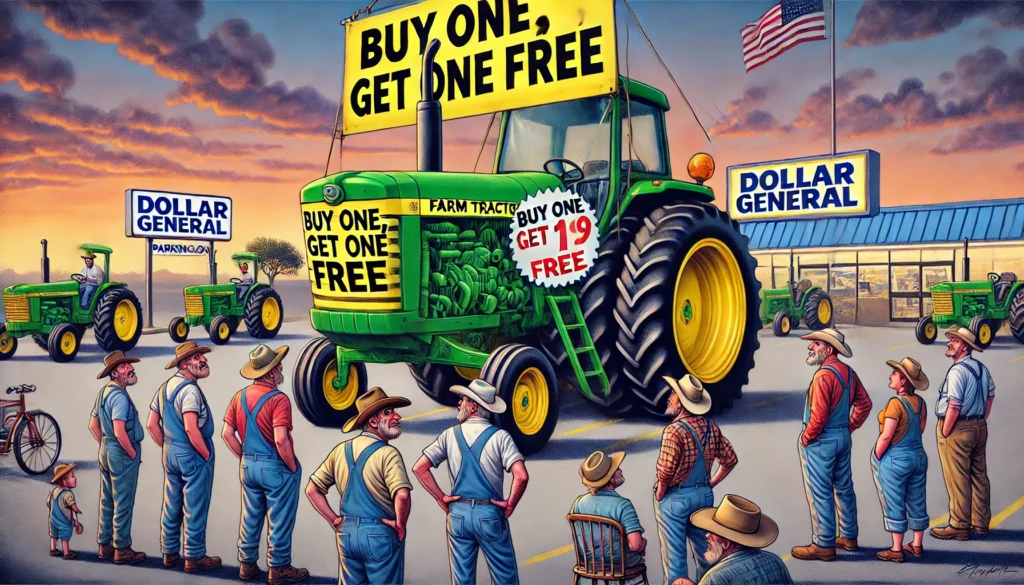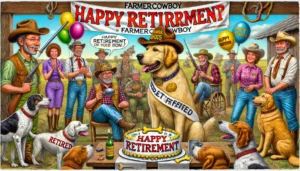
Dollar General Tractors A vivid and detailed satirical illustration of a farm tractor with a big Buy One Get One Free sticker on it showing the absurdity of the situation1.webp.webp
But can these tractors really help turn the tide for struggling farmers, or is this just another case of “you get what you pay for”? Let’s dive into the world of Dollar General’s new tractor line and see what all the fuss is about.

The Dollar General Tractor: A New Era of Discount Farming
At first glance, the idea of buying a tractor at Dollar General might seem absurd. After all, this is the store where you buy snacks, cleaning supplies, and maybe a pair of flip-flops in a pinch—not heavy machinery. But in the topsy-turvy world of modern agriculture, where farm incomes are shrinking and equipment prices are skyrocketing, Dollar General’s new tractor line might just be what the industry needs.
Take Farmer Joe from Bargainville, USA, who recently traded in his old John Deere for a shiny new Dollar General tractor. “I couldn’t believe it when I saw the price tag,” Joe said. “For less than the cost of a used pickup truck, I got myself a brand-new tractor. Sure, it’s not as fancy as my old one, but it gets the job done.”
Joe isn’t alone. Across the country, farmers are flocking to Dollar General to take advantage of the store’s latest offering. With prices that make even the most budget-conscious farmer smile, Dollar General’s tractors are flying off the shelves—or rather, the parking lots.
Eye-Witness Testimonies: Dollar-Powered Farming
We visited a Dollar General in the heart of farm country to see firsthand how the new tractors are being received. The parking lot was packed with pickup trucks, and inside, the shelves were emptying fast as farmers stocked up on everything from tractor parts to snacks for the ride home.
One farmer, Sally “Dollar Diva” McCoy, shared her experience. “I never thought I’d buy a tractor at the same place I get my paper towels, but here we are,” she said with a laugh. “It’s not the biggest or the best, but it’s cheap, and that’s what I need right now.”
Another farmer, Bill “Bargain Bob” Johnson, was equally enthusiastic. “I’ve always been a frugal guy, so when I heard about the Dollar General tractors, I knew I had to check it out,” he said. “It’s not going to win any awards for innovation, but for the price, you can’t beat it.”

Public Opinion: The Good, The Bad, and The Budget-Friendly
Public opinion on Dollar General’s new tractor line is divided. On one hand, many farmers are thrilled to finally afford the equipment they need without breaking the bank. On the other hand, there’s a growing sense of unease about what these low prices mean for the future of the industry.
“It’s great that Dollar General is making tractors affordable,” said Professor Penny Pincher, an economist specializing in agricultural markets. “But we need to be careful that we’re not sacrificing quality for the sake of saving a few bucks. There’s a reason high-quality equipment costs more—it lasts longer and performs better.”
Professor Pincher’s concerns are echoed by some in the farming community. While lower prices might seem like a good thing, they could also lead to increased pressure on manufacturers to lower their prices, which could, in turn, affect the quality of the equipment being produced.
Anecdotal Evidence: Stories of Success and Struggle
Farmer Jane “Lowball” Johnson recalls the day she brought home her new Dollar General tractor. “At first, I was thrilled,” she said. “But then I started thinking—why was it so cheap? It’s because no one else was bidding. We’re all struggling, and these low prices are just a reflection of that.”
Jane’s story is just one of many. Across the country, farmers are finding that while lower prices might seem like a blessing, they’re really just a symptom of a much larger problem. As more and more farmers go out of business, the demand for new equipment drops, and the prices follow suit. It’s a vicious cycle, and one that’s not easy to break.

Expert Insights: The Economics of Cheap Tractors
Agricultural economists have been keeping a close eye on the situation, and many are sounding the alarm. “Lower equipment prices are a symptom of a larger problem,” said Dr. Clara “Crops” Greenfield, a leading agricultural economist. “The agricultural industry is facing unprecedented challenges, and these price drops are just the tip of the iceberg. We need to address the root causes—declining farm incomes, rising costs, and the loss of small farms—if we want to see real change.”
Dr. Greenfield isn’t the only one raising concerns. Other experts have pointed out that lower prices on farm equipment could lead to increased pressure on manufacturers to lower their prices, which could, in turn, affect the quality of the equipment being produced.
“It’s a delicate balance,” said Dr. Penny Pincher. “But if done right, Dollar General’s tractors could be a game-changer for the industry. However, we need to be careful that we’re not sacrificing quality for the sake of saving a few bucks.”
Hypothetical Future: The Tractor of 2050
Imagine a future where Dollar General tractors dominate the market. Farmers across the country are planting their crops with equipment that costs less than a week’s worth of groceries. But in this hypothetical world, the number of farms has dwindled to a fraction of what it once was, and the few remaining farmers are left to pick over the scraps of a once-thriving industry.
In this future, the auctioneer’s call of “Going once, going twice—sold!” is met not with cheers, but with sighs of relief from the few who managed to hold on.
But for those who couldn’t keep up, the future is bleak. Small farms have disappeared, replaced by sprawling mega-farms that dominate the landscape. The equipment may be cheap, but the cost to the industry has been immense.

The Real Cost of Low Prices: A Call to Action
The agricultural industry is facing a crisis, and lower prices on farm equipment are just one symptom of a much larger problem. Farmers, policymakers, and industry leaders need to come together to address the root causes of the downturn and find ways to support small farms.
While Dollar General’s tractors might offer some relief in the short term, they’re not a sustainable solution. The industry needs to focus on long-term strategies that will help farmers thrive, not just survive.
As Farmer Joe put it, “We need to stop thinking about short-term gains and start focusing on the long-term health of the industry. Because if we don’t, we’re all going to end up with a lot of cheap equipment and nowhere to use it.”
Step-by-Step Guides for Farmers & Cowboy Readers
- Step-by-step guide to buying a Dollar General tractor: Start by checking the warranty—it might be shorter than your growing season.
- Pro tips: Don’t expect luxury features, but at least the price won’t break the bank.
- **Insider knowledge:**It looks like my last message was interrupted, so I’ll continue from where I left off.
Step-by-Step Guides for Farmers & Cowboy Readers
- Step-by-step guide to buying a Dollar General tractor: Start by checking the warranty—it might be shorter than your growing season.
- Pro tips: Don’t expect luxury features, but at least the price won’t break the bank.
- Insider knowledge: Keep a toolkit handy—you might need it sooner than you think.
- Best practices: Use the savings to invest in quality seeds and soil; your crops deserve better.
- Resourceful content: Remember, a cheap tractor is only as good as the work it can do—don’t skimp on maintenance.
Disclaimer:
This article is a satirical piece and should not be taken as professional financial advice. While Dollar General’s new line of tractors might sound appealing, we recommend doing thorough research before making any major farming equipment purchases. No tractors were harmed in the making of this story, though a few were purchased at bargain prices.
15 Humorous Observations on “Dollar General Introducing a New Line of Tractors”
- Dollar Deals, Tractor Wheels: You know the economy’s tough when your farm equipment comes with a “Buy One, Get One Free” sticker.
- Low Prices, High Horsepower: Finally, a tractor that costs less than a bale of hay!
- Budget-Friendly Farming: Who knew you could plow a field for less than the cost of a new pair of overalls?
- Rolling in Savings: When your tractor’s cheaper than your truck, you know you’re shopping at Dollar General.
- Cheap But Cheery: It might not have GPS, but at least the cup holder works!
- Dollar-Powered Plowing: Now you can farm and save for a dollar—just don’t expect the engine to last longer than your grocery trip.
- No Frills, All Thrills: Why pay for luxury features when you can get a no-frills tractor that’s just as stubborn as you?
- Farm Equipment for Less: Dollar General: Because why spend thousands when you can spend pennies on your plow?
- Big Savings, Small Farm: When you’re buying farm equipment at the dollar store, every acre counts.
- Discount Diesel: Finally, a tractor that runs on hopes, dreams, and whatever’s left in your wallet.
- Plow Now, Pay Later: Financing available, or just use the spare change in your truck’s ashtray.
- Get More for Less: Why settle for a second-hand tractor when Dollar General offers first-hand deals?
- Farming on a Dime: Because sometimes you just need to plant your crops and pinch your pennies at the same time.
- Dollar General Tractors: The only farm equipment that comes with a coupon for 50% off your next purchase.
- The General’s New Army: Forget John Deere—Dollar General’s tractors are taking over the fields, one discount at a time.
Dollar General Tractors Image Gallery
Originally Published at FarmerCowboy.com
2024-08-19 10:00:46
Karl Hoffman is a distinguished agriculturalist with over four decades of experience in sustainable farming practices. He holds a Ph.D. in Agronomy from Cornell University and has made significant contributions as a professor at Iowa State University. Hoffman’s groundbreaking research on integrated pest management and soil health has revolutionized modern agriculture. As a respected farm journalist, his column “Field Notes with Karl Hoffman” and his blog “The Modern Farmer” provide insightful, practical advice to a global audience. Hoffman’s work with the USDA and the United Nations FAO has enhanced food security worldwide. His awards include the USDA’s Distinguished Service Award and the World Food Prize, reflecting his profound impact on agriculture and sustainability.





I’m loving this post so much! ??